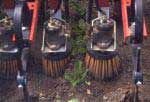 |
Weed control and transplanting techniques in row crops
Beet root is an excellent crop for feeding to both cattle and sows. The weeded crop also plays a cleaning role in rotations; and since the roots are high yielding they liberate more land for the growing of cereals and protein crops. In addition, the crop utilises animal manures effectively. To keep the organically grown crop free of weeds, however, a big manual effort is required. For this reason it is rarely grown on organic holdings at the present time.
The biggest difficulty in weed control lies in securing their early destruction along the rows. At an early stage of crop development it is not possible to carry out selective mechanical weeding without damaging the beet roots. For this reason it is necessary to weed by hand to remove the initial weeds. Later it is possible to use harrows or row cultivators fitted with hoes for in-row weed control, although this demands a marked difference in plant-size between the main crop and the weeds.
This project examines the hypothesis that beet root plants can be given a head start over the weeds by pre-germinating them, and then transplanting them into clean soil. Experience suggests that following the initial rooting period, effective in-row control of sprouting weeds can be achieved at the cotyledon stage of growth. In this way it should be possible to replace manual weeding with a rational, mechanised process. If the system proves to be effective, the cost of producing beet roots will be greatly reduced, and the possibility will exist for transferring this technology to other crops, such as vegetables.
This project aims to find a pre-germination procedure that secures the best quality of beet root at the lowest cost. The roots are transplanted at the four-leaf stage, the soil preparation and transplanting processes being adapted to achieve rapid and effective rooting. The objective is that the beet root crop should be able to tolerate harrowing within 1 to 2 weeks of being transplanted. The project also includes the development of methods and strategies for weed control.
Summary
Publications
Project title
II.5 Weed control and transplanting techniques in row crops
Project leader
Martin Heide Jørgensen,
Danish Institute of Agricultural Science, Research Centre Bygholm, P.O. Box 536, DK 8700 Bygholm
Tel: +45 7560 2211, Fax: +45 7562 4880
E-mail: MartinHeide.Joergensen@ agrsci.dk
Project participants
Erik Fløjgaard Kristensen, Bo Melander and Jens Willumsen, Danish Institute of Agricultural Science
|